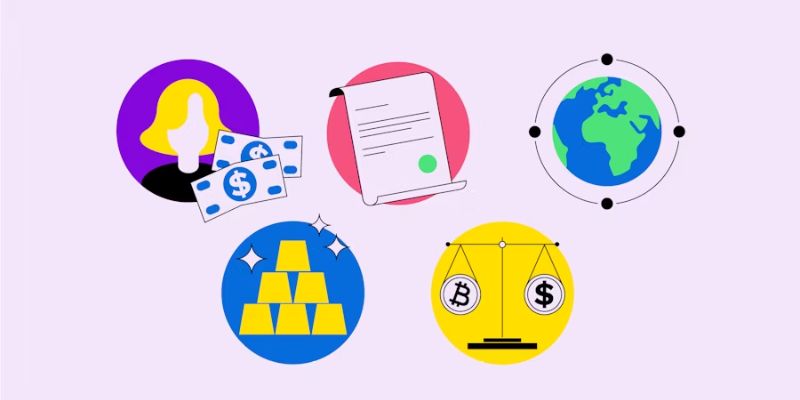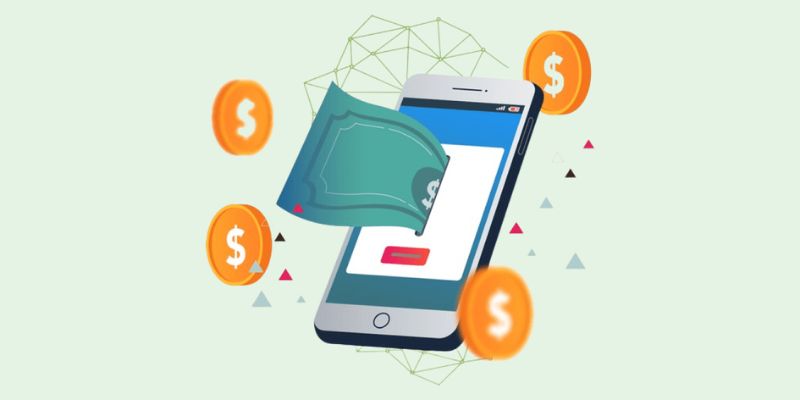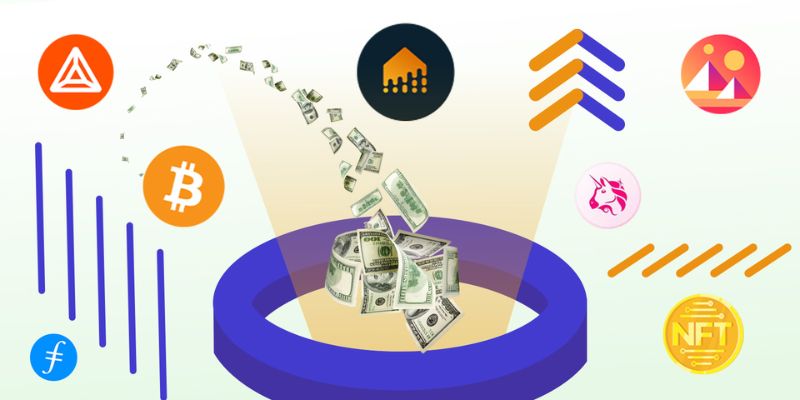Crypto Tools for Dummies: Unraveling the Mysteries of Digital Currency
Dollars, euros, yen – you know them, but what about digital money? It’s time to tackle the tech behind the talk with crypto tools for dummies. We’re diving deep without making your head spin. Think of this as your map in the world where ‘crypto’ isn’t just a buzzword but your new frontier. Buckle up! From Bitcoin basics to blockchain brains, I’ll walk you through, step by step, starting with what you truly need to set up shop in this digital domain. Then, we’ll ramp up to smart contracts and tax tricks. Want to understand without the headache? Let’s go!
Demystifying Cryptocurrency: A Beginner’s Breakdown
Understanding the Basics of Bitcoin and Altcoins
Let’s break down the crypto world, starting with Bitcoin and altcoins. Bitcoin is like the first kid on the block. It’s digital money that you can send to anyone, no bank needed. Altcoins are other cryptos you might hear about, like Ether or Ripple. They’re like Bitcoin’s younger siblings and each has its own twist.
Getting into Bitcoin for beginners means understanding it’s like online cash. You can’t hold it, but it has real value. Easy, right? Now, with altcoins, it’s a bit different. There are thousands out there! Some are for quick payments, while others let you use cool apps without any middlemen.
Setting up a crypto wallet is key. It’s where you keep your digital coins safe. Think of it like a virtual backpack. To secure crypto storage, you can use a hot or cold wallet. A hot wallet is online and easy to use, like a wallet in your back pocket. A cold wallet is offline and super secure, sort of like a safe for your digital money.
Remember, safety first! Always double-check websites and never spill your wallet’s secret keys. They’re the magic words that lock up your crypto treasure.
Comprehending Blockchain Technology and Its Impact
Now, let’s talk about blockchain technology explained simply. Imagine a super-safe list that records every single Bitcoin deal. No one owns this list. It’s copied across computers all over the world. When you send Bitcoin, that transaction joins the list. Everyone checks it to make sure it’s legit.
So why is this cool? Because it’s like having a guard for your money, but instead of one guard, you have thousands, all over the world. This is what makes your digital cash safe from tricksters.
Blockchains can track more than just money. They can keep track of anything of value. Think concert tickets, house deeds, or even votes in an election.
Blockchain is a game-changer. It cuts out the middle person, whether that’s a bank, a lawyer, or a ticket seller. This means you can do lots of things cheaper and faster.
Understanding Ethereum takes us a bit deeper into blockchain. It’s like a giant computer that anyone can use. You can make contracts that run themselves, or build apps that no single person controls.
Remember, this is just the start. The crypto world is huge and full of amazing stuff to explore. Keep learning, stay safe, and welcome to the future of money and technology!

Setting Up for Success: Essential Crypto Tools
Choosing and Securing Your First Crypto Wallet
To start, you need a crypto wallet. It’s like a real wallet but for digital coins. A good wallet keeps your money safe. Think of it as your new pocket for Bitcoin or other cool digital money.
Think of Bitcoin like paper money. But it cannot wrinkle. It lives on your computer or phone. Think of altcoins like nickels, dimes, and quarters.
Let’s set up a wallet! First, pick between a hot wallet or a cold wallet. Cold wallets are not online. They are super safe. Hot wallets connect to the internet. They are handy for quick access.
Securing your wallet needs more than a good password. Use two-factor authentication. This is a second check to ensure it’s really you. It’s like a secret club. You need the right password and the secret code.
Navigating Crypto Exchanges and Making Your First Trade
Exchanges are like shops where you swap money but for crypto. To use one, sign up, add money, pick a crypto, and buy. They let you trade different kinds of digital money too.
Imagine you want new shoes. Online shops have lots. Crypto exchanges are online shops but for Bitcoin and friends.
When you make a trade, it’s a deal – you trade your dollars for something like Bitcoin. Each trade has a small fee, like when you use a card at a store.
Blockchain is like a big book where all these trades write themselves down. This book can’t lie or cheat. It’s clear for all to see and tough as nails.
Remember to trade small first. Learn how the wind blows. Cryptocurrency can be fun. But it’s new to many and can change quick. So, start easy.
Alright! Now you know a couple of key tools to kick off your crypto trip. Grab your wallet and dive into the exchange. Each step is a big one. But hey, you’re learning something awesome!

Advanced Cryptocurrency Concepts Simplified
Exploring the World of DeFi and Smart Contracts
DeFi means ‘decentralized finance’. It’s a new way to handle money with no banks. Just like an arcade needs tokens to play, DeFi uses digital coins. But DeFi can be more useful. You can lend, trade, and earn on your cash. It all works on blockchain, the same tech behind Bitcoin. Picture blockchain as a super-safe, never-ending list of who-owns-what. No one can mess with this list. It keeps everyone honest.
Smart contracts are like robo-promises on the blockchain. They self-execute when stuff happens. Think of them as tiny programs. Just like a vending machine. You put in money, choose your snack, and get it. No shopkeeper needed. Smart contracts do this with deals, like selling art or owning a piece of a song.
Now, how do you start in DeFi? Get a wallet first. This is where your coins live. I’d say it’s like your own pocket in cyberspace.
Once set, you can dive into DeFi pools. These pools are like big pots of money. People throw in their coins to get or lend money. And they can earn more coins in return. Simple, right?
Smart contracts make sure everyone plays by the rules. No lies, no tricks. And the best part, you can see every detail yourself. So, trust is easy here.
Remember, these new coins are risky. Prices can go up or down real fast. Always think it over before you jump in.
Grasping the Fundamentals of Crypto Tax and Safe Trading Practices
Crypto tax is just like toy tax. When you trade your action figures and get a better one, that’s a gain. Uncle Sam wants a piece of that. Swap coins, sell them, or get new ones from mining—you might owe some tax.
Let’s keep it all safe. Start with trading. Only trade on well-known exchanges. These are places online where you can buy and sell coins. And always check prices. Some coins have funny names but they might not be worth your lunch money.
Now, safeguarding your coins. Think of your crypto wallet as a lunchbox. Put a lock on it. This lock is your private key and passwords. Never share them. Just like you wouldn’t give someone your house key.
Lost keys are trouble. Your coins could be gone forever. So write down backup codes and keep them hidden. Maybe under your bed?
Most folks use hot wallets—these need the internet. Think of them like your pocket; easy to reach, but easy to pick too. Cold wallets are like safes. Offline and safer.
Using two-factor authentication is a must. It sends codes to your phone to make sure it’s you. Double-checking never hurt anyone.
Facing scams? If a deal feels too good, it’s probably a trick. No free lunches here. If someone says you’ll get rich quick, walk away. Good deals need good thinking. Take your time.
Understand these basics, and you can trade smarter and safer. Remember, slow and steady wins the race. And in the crypto world, safe is the new cool.

Expanding Your Crypto Knowledge Base
Delving into NFTs and Their Role in Digital Ownership
NFTs stand for non-fungible tokens. Think of them like collector’s items, but digital. They prove you own something unique in the online world. Each NFT is different and you can’t swap them like trading cards. They use blockchain to record who owns what, making sure it’s secure. This makes it easy to buy, sell, or trade digital stuff, from art to music.
NFTs can be anything digital. Artists love them because they can sell their work without a middleman. They can even get paid every time their work resells. This changes how creators make money in the digital space.
Some think NFTs are just a trend. But they have real uses beyond selling art. They could change how we own things in games or collect digital items. Their worth lies in being one of a kind. This makes them different from regular money which you can trade without losing value.
Understanding Decentralized Applications and Stablecoins
Decentralized applications, or dApps, run on a blockchain. They’re not controlled by one person or company. This means no single point of failure. They can do lots of things like let people vote, lend money, or play games.
Why use dApps? They’re open to anyone and are hard to shut down. Users help run them by pitching in with their computers. This is like a community project but for software.
Stablecoins are like regular coins but more stable. They’re tied to something that doesn’t change much in value, like the US dollar. This means they don’t swing wildly in price like other cryptocurrencies. They’re great for day-to-day use, like paying for coffee or sending money.
Believe it or not, stablecoins make the wild world of crypto a bit safer. With stablecoins, you don’t have to worry so much about losing your shirt if prices plunge. You can also switch your money into stablecoins if you think other crypto prices are about to fall. It’s like having a safe zone in the risky game of crypto trading.
Both dApps and stablecoins show how crypto is about more than just money. They’re parts of a new kind of internet where we get a say in how things work and don’t need to trust big companies to handle our stuff. It’s about power to the people and making sure everyone plays fair.
In this blog, we broke down crypto basics and explained key tools for success. We covered everything from getting to know Bitcoin and other coins, to how blockchain changes the game. We then talked about picking the right wallet and making your first trade on exchanges.
Later, we dived into DeFi, smart contracts, and keeping your crypto trades safe and tax-smart. Finally, we looked at NFTs and how they shake up owning digital stuff, plus the lowdown on decentralized apps and stablecoins.
There’s a lot to take in, but now you’re set to start your crypto journey. Stay curious, keep learning, and remember to trade smart. Happy investing!
Q&A :
What are the basic crypto tools that every beginner should know about?
Cryptocurrency can be a complex subject for newcomers, but certain tools can make your journey into the crypto world easier. Essential tools for beginners include a reliable cryptocurrency exchange platform to buy, sell, and trade digital assets, a secure crypto wallet for storing cryptocurrencies, and portfolio trackers to monitor investments. Additional beneficial tools are market news aggregators for staying updated, and security tools like two-factor authentication (2FA) to keep your accounts secure.
How do I start using crypto tools if I’m a complete novice?
Starting with crypto tools requires a beginner to take a few thoughtful steps. First, educate yourself on the basics of blockchain and cryptocurrencies. Next, find a user-friendly cryptocurrency exchange and create an account to start trading. Opt for a secure and straightforward wallet to keep your cryptocurrencies safe. Use simple portfolio trackers to follow your assets and watch educational tutorials or use demo accounts if available to practice without risk.
What are the most user-friendly crypto exchanges for beginners?
User-friendly cryptocurrency exchanges for beginners typically have an intuitive interface, helpful customer support, and educational resources. Look for exchanges like Coinbase, Binance, or Kraken, as they offer these features along with beginner guides to help you get started. They also provide a variety of cryptocurrencies and straightforward buying, selling, and trading processes, making them a good starting point for novices.
Is there a way to practice crypto trading without risking money?
Yes, many beginners can practice crypto trading without risking real money by using demo accounts provided by certain crypto exchanges. These virtual trading accounts, also known as paper trading accounts, allow users to simulate cryptocurrency trading with no financial risk. Platforms such as eToro and Bitfinex offer these demo trading options, which can be invaluable for gaining trading experience before investing in actual cryptocurrencies.
What is the importance of a crypto wallet, and which one should beginners use?
A crypto wallet is crucial because it is where you store, send, and receive cryptocurrencies securely. As a beginner, you should look for wallets that are reputable, easy to use, and offer strong security features. For starters, hardware wallets like Ledger or Trezor offer high security, while software wallets such as Exodus or Trust Wallet provide good balances between security and convenience. It’s important to research and choose a wallet that suits your needs and comfort level.
